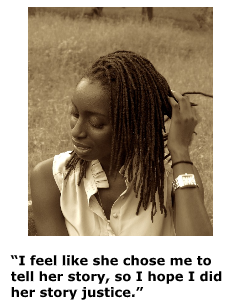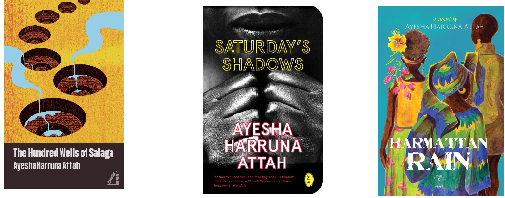 ReConnect Africa is a unique website and online magazine for the African professional in the Diaspora. Packed with
essential information about careers, business and jobs, ReConnect Africa keeps you connected to the best of Africa.
ReConnect Africa is a unique website and online magazine for the African professional in the Diaspora. Packed with
essential information about careers, business and jobs, ReConnect Africa keeps you connected to the best of Africa.



Inspired by her family’s fascinating history with slavery, Ayesha Harruna Attah’s forthcoming third novel, The Hundred Wells of Salaga, tells the story of two women in pre-colonial Ghana.
ReConnect Africa spoke to the talented Ghanaian novelist about her motivation for writing and how her family’s history shaped her latest novel and influenced her career path.
ReConnect Africa: Can you tell us a little about you and your background?
Ayesha Harruna Attah: I grew up in Accra, Ghana, where I lived until I was seventeen. My parents were both in the media – my mother started out in radio, and my father worked in film. They eventually established their own newspaper. I studied science in college and finally grew comfortable in my writing skin a few years later.
ReConnect Africa: Did your parents’ experiences in media – your mother was a journalist and your father ran a national newspaper - influence your decision to write?
Ayesha Harruna Attah: It did. I wrote short pieces for their newspaper while I was in secondary school. But even before that, they had what I thought was the coolest magazine in Accra, Imagine. It was inspiring seeing them gather material for the magazine and I think subconsciously that stuck. When my dreams to become a doctor fell through—mostly because I realized I didn’t have the heart for the profession—writing was a natural change in direction.
ReConnect Africa: What inspired the story of ‘The Hundred Wells of Salaga’?
Ayesha Harruna Attah: My great-great grandmother was sold into slavery and ended up in the infamous Salaga slave market. I wanted to imagine what her life could have been like before and after she was enslaved.
ReConnect Africa: How did it feel to be telling a story through the eyes of a woman from who you are directly descended, and what challenges did you encounter in getting the ‘voice’ right?
My great-great grandmother was sold into slavery and ended up in the infamous Salaga slave market. I wanted to imagine what her life could have been like before and after she was enslaved.
Ayesha Harruna Attah: I feel like she chose me to tell her story, so I hope I did her story justice. I grappled with trying to preserve her dignity and with letting her fully develop as her own character. I also wanted to make sure I got as many facts right as possible. The story was set in pre-colonial Ghana, so I researched everything – what people ate before wheat flour came into our markets, what kind of lighting was used in rooms, what people wore, what young women’s preoccupations were at the time.
ReConnect Africa: The book follows the paths of two women living in very different circumstances in pre-colonial Ghana. How easy was it to research that period of history?
 Ayesha Harruna Attah: There were books on Salaga that were my beacons. It was a time when many Europeans visited West Africa in search of the famed gold they’d heard of, writers such as Louis-Gustave Binger, Heinrich Barth. The Gold Coast was already a colony of the Gold Coast and so they had records I could consult.
Ayesha Harruna Attah: There were books on Salaga that were my beacons. It was a time when many Europeans visited West Africa in search of the famed gold they’d heard of, writers such as Louis-Gustave Binger, Heinrich Barth. The Gold Coast was already a colony of the Gold Coast and so they had records I could consult.
I especially enjoyed reading the accounts of African missionaries such as Theophilus Opoku and David Asante. Even though they had European training, they considered the people they encountered with a lot more respect and dignity than their European counterparts.
ReConnect Africa: Was this story an opportunity for you to explore the ideas of freedom and confinement in different contexts?
Ayesha Harruna Attah: It was. It was also why I chose a woman who was considered one of the freest in her society—the daughter of the chief—and contrasted her life with that of a woman who sold into slavery. Ultimately, the reader gets to decide what freedom truly means.
ReConnect Africa: This is your third novel. Can you tell us a little about your first two books?
Ayesha Harruna Attah: Harmattan Rain is the story of three generations of a family and how their lives intersect with the story of Ghana from just before independence to the late 1990s.
Saturday’s Shadows follows four members of a family in a fictional West African country during a transition from military to civilian rule and is about how the external affects their internal dynamics.

ReConnect Africa: Are you working on a new project and do you see more novels as your focus for the future?
Ayesha Harruna Attah: I am working on my first non-fiction book, about the kola nut, famous through West Africa for marriages, births, deaths, and much more. I hope to keep writing historical fiction – there’s so much in our culture we haven’t mined yet.
ReConnect Africa: Where can our readers buy a copy of the book?
Ayesha Harruna Attah: On Cassava Republic’s website (www.cassavarepublic.biz), on Amazon, and in all good book shops in the UK from May 8.
